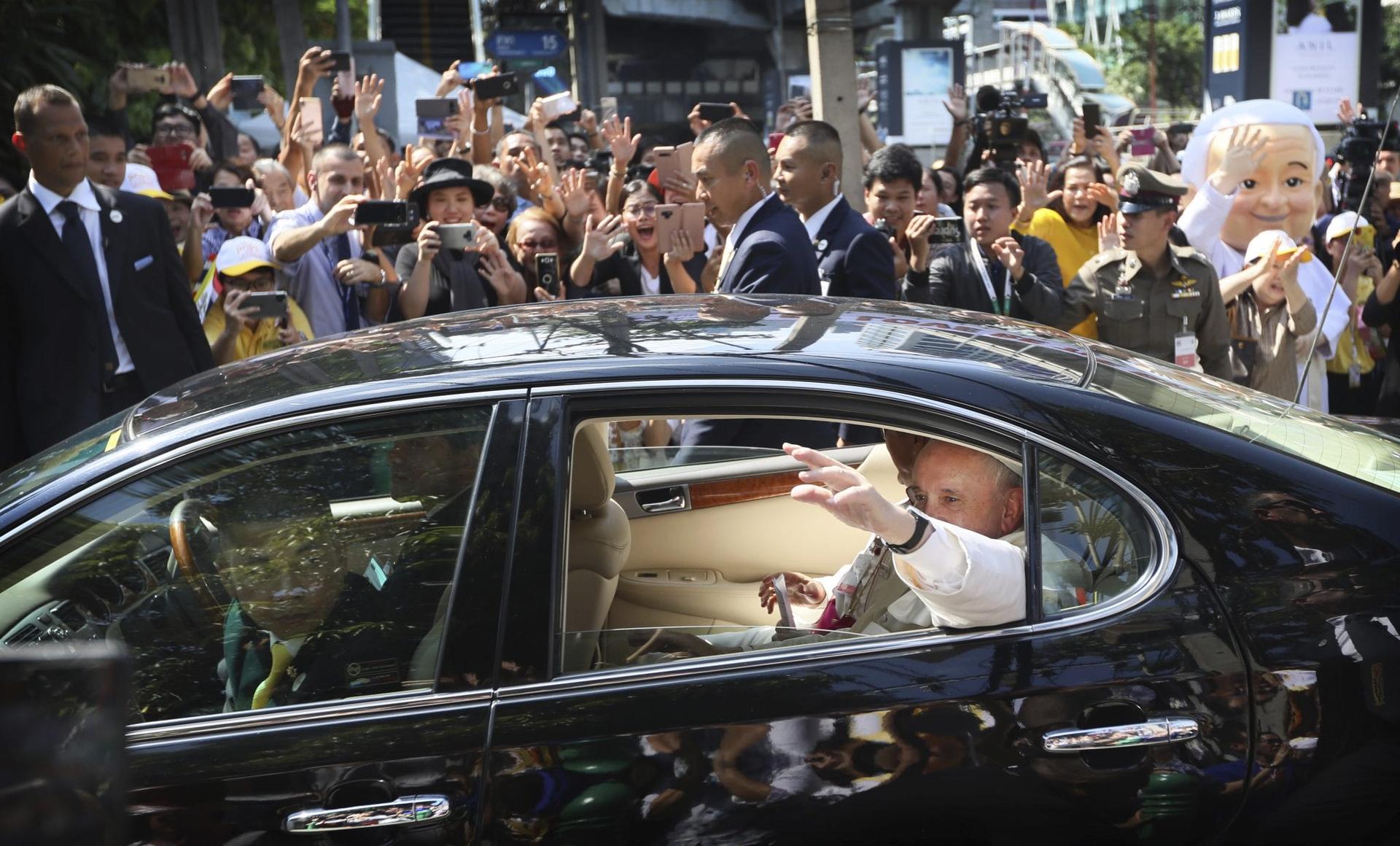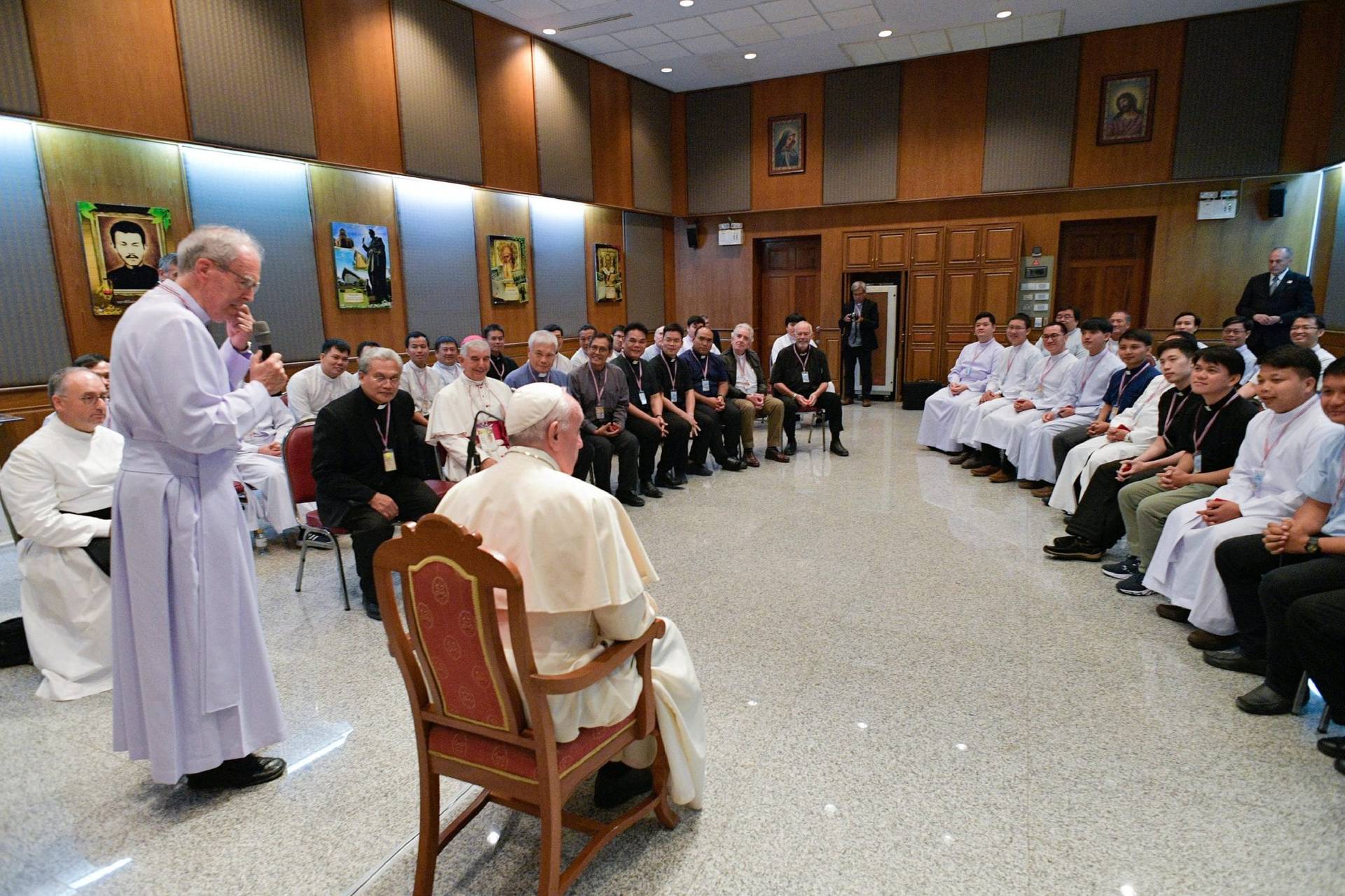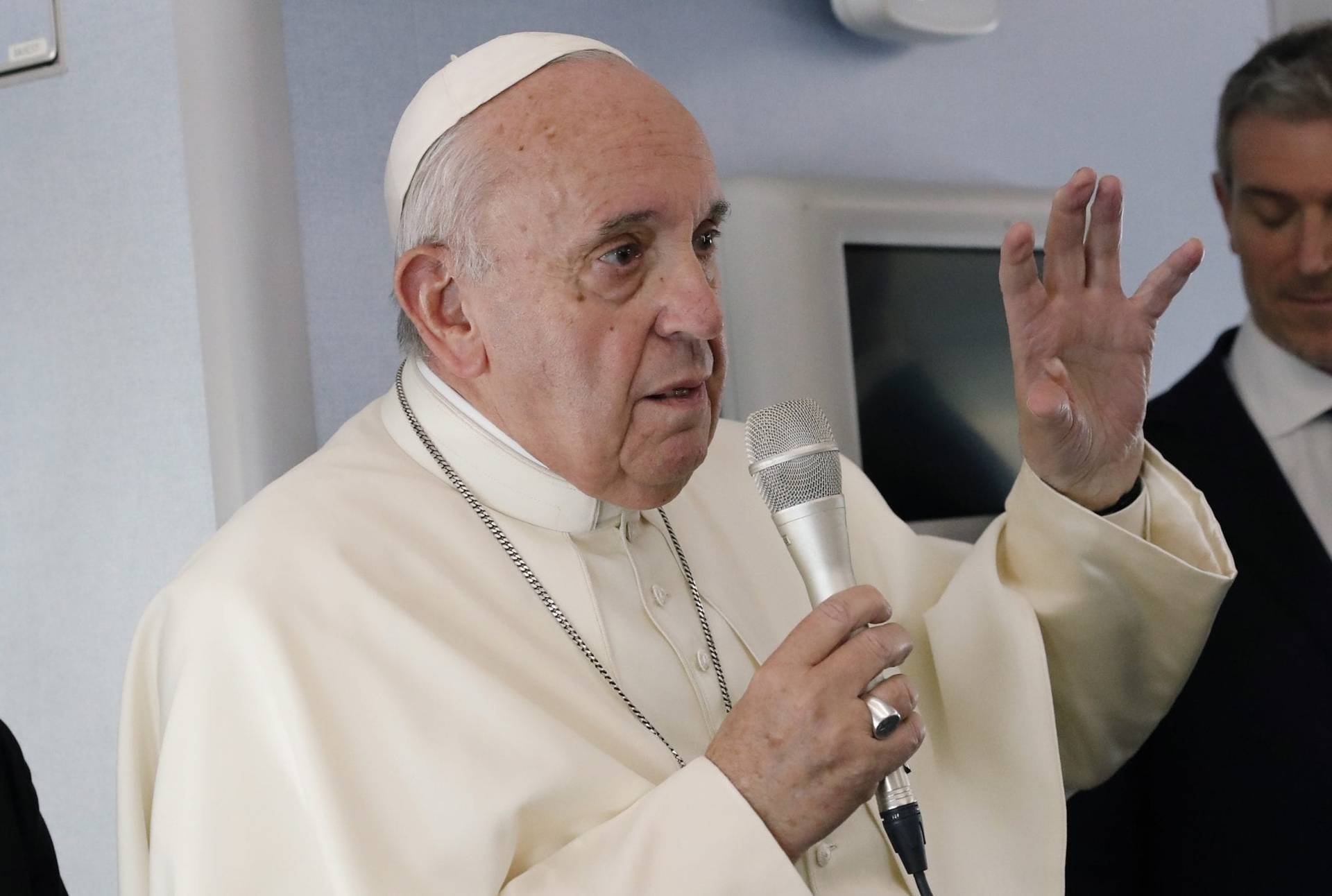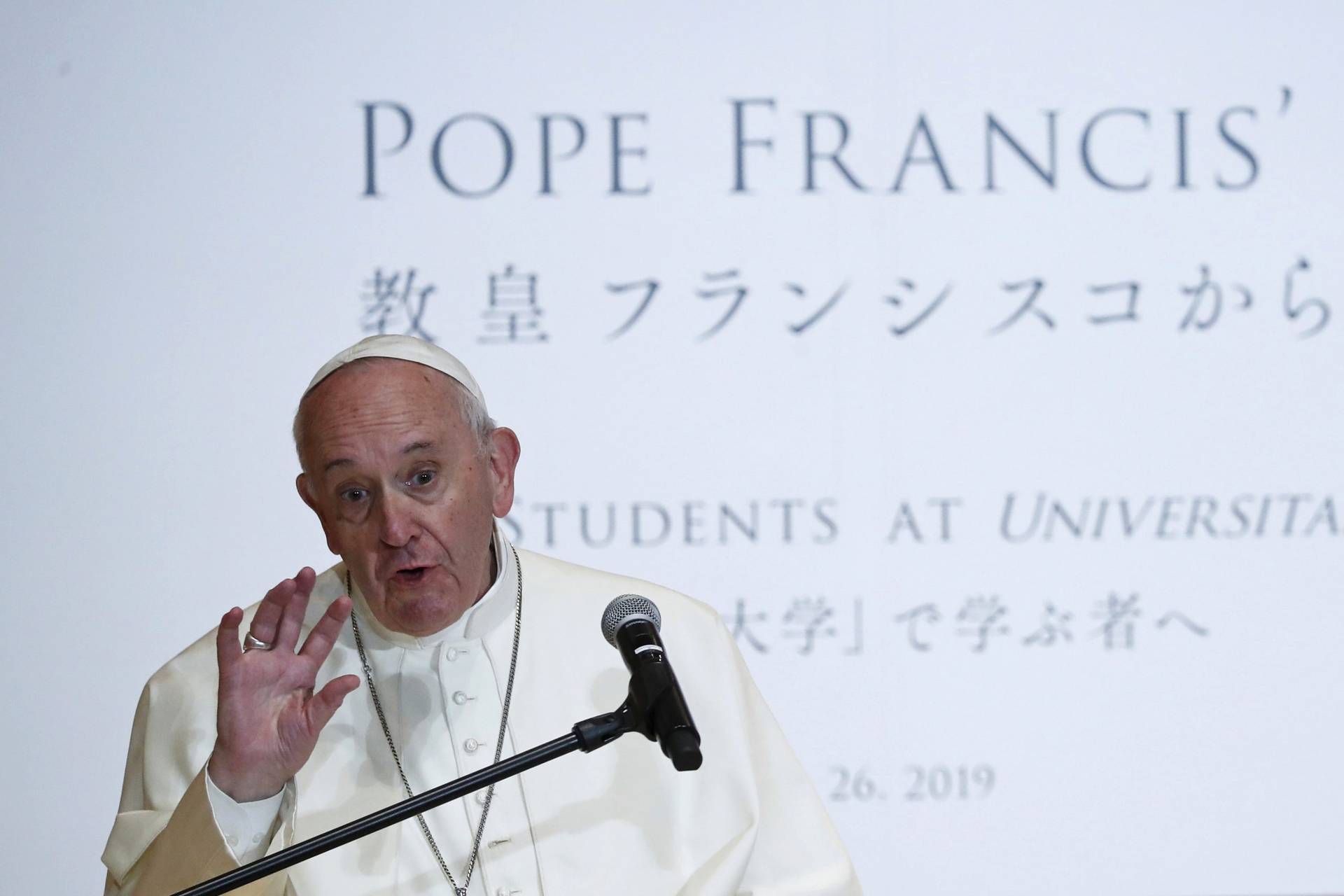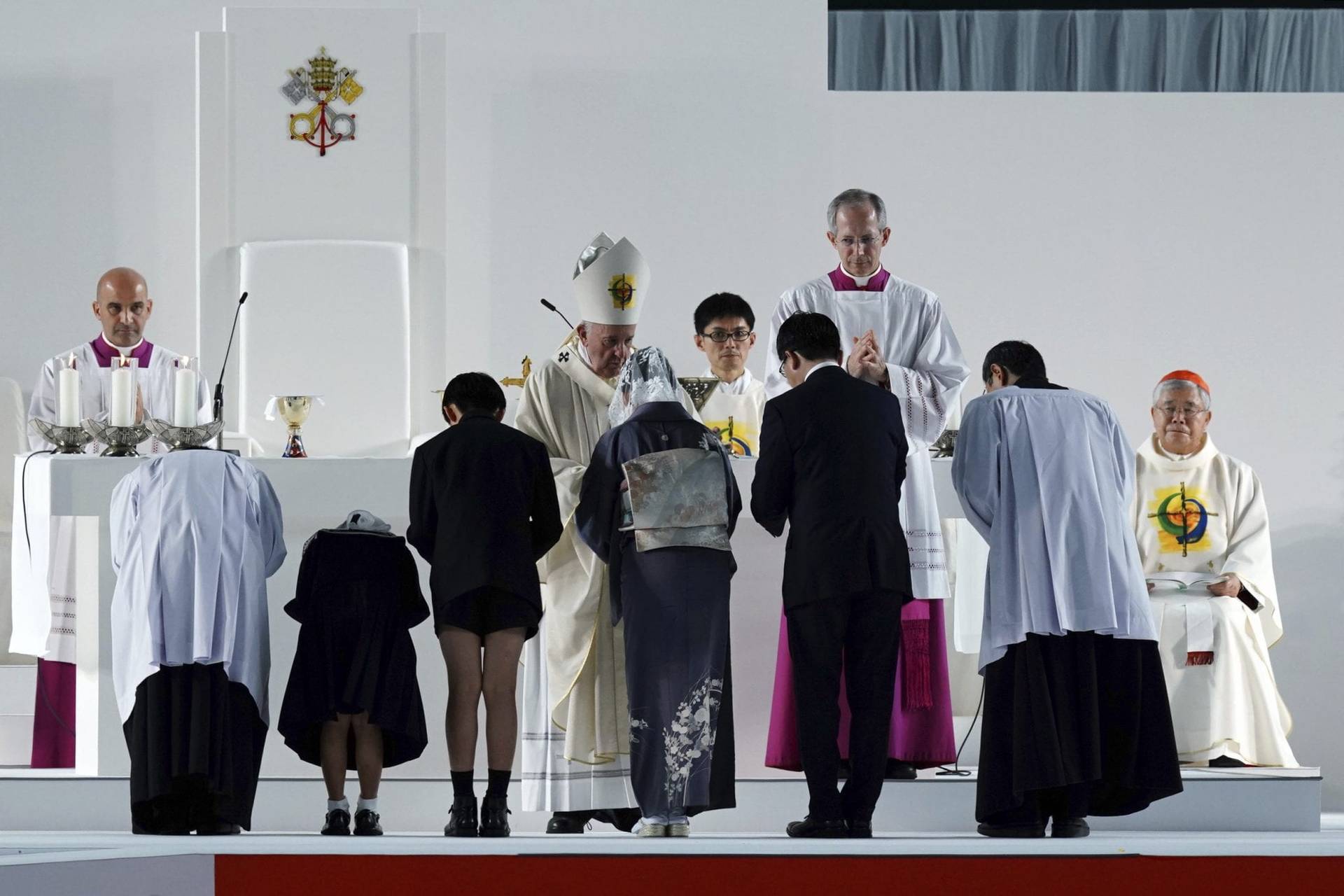BANGKOK, Thailand — Pope Francis opened his Nov. 20-23 trip to Thailand Wednesday by denouncing exploitation of women and children, urging a welcoming stance to migrants and promising that the Catholic Church is ready to help build a just and inclusive society.
Francis said he thinks of “all those women and children of our time, especially those who are wounded, violated and exposed to every form of exploitation, enslavement, violence and abuse.”
The pope was speaking during a meeting with local authorities, representatives of civil society and the diplomatic corps in the “Inner Santi Maitri” Hall within Bangkok’s Government House.
Forced prostitution, including children, is one of the consequences of Thailand’s sex tourism industry, with thousands of foreigners arriving yearly to pay for sex.
Despite the fact that Thailand is one of the world’s foremost destinations for sexual tourism with minors, prostitution is banned by law. Most of the children abused are foreigners hailing from Vietnam, Cambodia and Laos who have fallen in with networks that traffic human beings. Even though child prostitution is illegal, enforcement of the law is weak.
If you take a short walk around some areas of Bangkok, you will find pimps directing children to throw themselves at foreigners.
The pontiff expressed “appreciation” for efforts by the Thai government, NGOs and individuals to end human trafficking and other forms of modern-day slavery, to “uproot this evil and to provide ways to restore” the dignity of the children and women forced to prostitute themselves.
In this year marking the thirtieth anniversary of the United Nations’ Convention on the Rights of the Child and Adolescent, Francis said everyone is called to protect children, their social and intellectual development, access to education and psychological and spiritual growth.
Francis also said that “today, more than ever” societies need “artisans of hospitality,” committed to the integral development of each person, “within a human family committed to dwelling in justice, solidarity and fraternal harmony.”
Thailand, he said, has always understood this ideal by being a “multi-ethnic and diverse nation.”
As he has done before, Francis expressed skepticism for a globalization that is “all too often viewed in narrowly economic terms, tending to erase the distinguishing features that shape the beauty and should of our people.”
Instead, the pope said, societies should aspire to a unity that respects diversity, serving as an inspiration for those concerned about the “world we wish to leave to our children.”
On movements of migration that are “one of the defining signs of our time,” the pontiff said they’re defining because of the conditions in which they take place, “a phenomenon that represents one of the principal moral issues facing our generation.”
The migration crisis, he said, cannot be ignored, and Thailand itself, Francis noted, has itself had to deal with the flight of refugees from nearby countries. According to UNHCR, the United Nations refugee agency, the kingdom currently hosts some 97,000 refugees, most of them fleeing violence and persecution in Myanmar.
“Once more, I express my hope that the international community will act with responsibility and foresight, will work to resolve the issues that have led to this tragic exodus, and will promote safe, orderly and regulated migration,” he said, urging every country to devise means to protect the rights of migrants and refugees.
Francis said those forced to flee their homes face dangers, uncertainty and exploitation as they try to find freedom and a decent life for their loved ones.
“It is not just about migrants,” he said. “It’s also about the face we want to give to our societies.”
Francis’s visit to Thailand coincides with the 350th anniversary of the establishment of the Catholic Mission in Thailand and the 50th anniversary of the establishment of diplomatic relations between the country and the Holy See, something General Prayut Chan-o-cha, the prime minister, noted during his words welcoming the pope.
A Buddhist himself, the political leader expressed his “high admiration” for the leader of the 1.3 billion Catholics around the world, particularly Francis’s “noble undertakings” promoting the development of human resources, the eradication of poverty, the building of social equality, the preservation of the environment and the promotion of worldwide peace.
In his remarks, Francis said that he wanted to “personally assure” those present of the commitment from the “small but vibrant” Catholic community – there are just about 400,000 Catholics in the country — to maintain the “distinctive” characteristics of the Thai people: “peaceful and loving, but not cowardly.”
After leaving Thailand on Saturday, the pontiff will travel to Japan, before returning to Rome on Tuesday.
Dialogue with Buddhists
The first interreligious note of Francis’s fourth Asia swing came when he encountered Thailand’s Supreme Buddhist Patriarch. Quoting St. John Paul II, he said the majority of Thais have “drunk deeply from the sources of Buddhism,” which has “imbued their way of venerating life and their ancestors, and leading a sober lifestyle based on contemplation, detachment, hard work and discipline.”
The quote comes from John Paul’s 1999 Apostolic Exhortation Ecclesia in Asia. The Polish pontiff was the first head of the Catholic Church to enter the Wat Ratchabophit Sathit Maha Simara Temple where the meeting took place. Supreme Patriarch Somdet Phra Ariyavongsagatanana IX, today 92, was present at that visit 35 years ago.
“The meeting on that day remains impressed in my memory,” he told Francis.
The traits Thais have received from Buddhism, Francis said, nurture their “distinctive characteristic as a ‘smiling people’.”
he meeting took place in the Wat Ratchabophit Sathit Maha Simara Temple, which, as the Supreme Buddhist Patriarch noted, is an “auspicious” venue as it holds the relics of several members of the royal family who have met popes, going back to King Rama V, who had an audience with Pope Leo XIII in 1897. (Among the relics, there is also one of Buddha).
The temple is not far from the Grand Palace and the Wat Pho temple, also known as the one of the “reclining Buddha.” Built in the 1860s, during the reign of King Rama V, the interior showcases traditional Thai architecture along with gilded Italian architecture, which is unique in Thailand.
According to Francis, these “small steps” have helped to give witness to a culture of encounter, even in today’s world, “so prone to creating and spreading conflict and exclusion.”
“When we have the opportunity to appreciate and esteem one another in spite of our differences, we offer a word of hope to the world, which can encourage and support those who increasingly suffer the harmful effects of conflict,” the pope said. “Occasions like this remind us how important it is for religions to become more and more beacons of hope, as promoters and guarantors of fraternity.”
During his remarks, Francis too did a walk down memory lane of exchanged visits, saying the path of mutual trust and fraternity the Vatican and Thai Buddhists are walking is one the Church wants to further, through scholarly exchange that will allow both to live as good “neighbors.”
“We will likewise be able to promote among the followers of our religions, the development of new charitable projects, capable of generating and multiplying practical initiatives on the path of fraternity especially with regard to the poor and our much-abused common home,” he said.
Editor’s note: this story is being updated.
Follow Inés San Martín on Twitter: @inesanma
Crux is dedicated to smart, wired and independent reporting on the Vatican and worldwide Catholic Church. That kind of reporting doesn’t come cheap, and we need your support. You can help Crux by giving a small amount monthly, or with a onetime gift. Please remember, Crux is a for-profit organization, so contributions are not tax-deductible.
